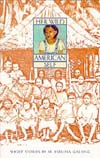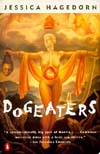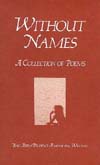by Catalina Cariaga
In Cultural Evidence, Ms. Cariaga displays the full scope of her considerable poetic talents. The collection is compelling and earnest, and her artistry is breath-taking. She has given us the gift of her voice with the publication of this first monograph, years in the making.
Influenced by the work of Theresa Hak Kyung Cha, the poems are always richly nuanced and layered with many meanings that newly reveal themselves after each rereading. However, one never gets the sense of "knowing" a poem completely, even after numerous readings; the poems constantly ask us to work hard to get at their meanings.
The three-part structure of the book, along with the fascinating epigraphs from which she takes the titles of her chapters, provides a sense of the delicate balance the work negotiates on multiple levels: art, silence, language, politics, identity, power and love.
The poet specifically deals with, among other things, her family's histories and her identity as a Filipino (American) and as a woman.
You can order this book directly from Subpress Collective at the University of Hawai`i in Manoa (e-mail me so I can forward to you the order form - no tax and free shipping), or from Amazon.com.
Honolulu: Subpress Collective,
1999.
by Virginia Cerenio
This monograph serves as an important but as yet under-acknowledged marking post for Filipino American literature. Emerging from the political activism of the 1960s and 1970s in the Bay Area, California, Cerenio here burns her stamp in the traditionally male-dominated "canon" of Filipino American literature with which she came of age as a writer and political activist.
The many strengths of her work include her sensitive and perceptive poems about the manong generation, her relationship to the older male writers of Filipino America, and her identity as a Filipino American woman.
Available from the Kearny Street Workshop Press; e-mail them for a free catalog. Also available from Amazon.com.
San Francisco: Kearny Street Workshop
Press, 1989.
This anthology contains an essay by the Filipina Thelma B. Kintanar called "Towards the New Filipina: Filipino Women Novelists and Their Novels." She explores the emergence of a new category of writing by Filipina novelists after World War II, one that comes from a feminist perspective.
Ed. by Thelma B. Kintanar et al.
Quezon City, Philippines: University of the Philippines Press,
1994.
This anthology is a remarkable collection of Filipina women's writing. It deals specifically with Philippine issues, and ranges in topic from the "woman question" and politics to the media and society in general - all in relation to women and literature. What is especially remarkable about the essays is that several are written like stories, and all see the literature of women as a way to comment on society.
Ed. by Mila Astorga Garcia et al.
Quezon City, Philippines: New Day, 1985.
This anthology includes our featured writer Emily P. Lawsin's poem "Notes from a University Writing Group," which is included in the poetry section of this web site.
Ed. by Luis H. Francia and Eric Gamalinda. New York:
Asian American Writers' Workshop, 1996.

by M. Evelina Galang
In this collection of short stories, Galang explores different models of Filipina Americans, all of whom struggle with identity and their place in Filipino communities and in an American overculture. The stories are insightful and her precise, poetic voice is a joy to read.
Minneapolis: Coffee House Press, 1996.

by Jessica Hagedorn
This novel is one of the most incredible books I have ever read. Hagedorn, through the novel's postmodern structure (i.e. the multiple perspectives), constructs the world of Manila and the Philippines during the late dictator's regime, and through the charcater of Rio, manages to lend this world a Filipina American perspective. The novel offers several different models of Filipinas; from the submissive wife to the revolutionary, this incredible work has it all.
New York: Penguin Books, 1990.
Other titles include Gangster of Love, a novel, and
Charlie Chan is Dead, an anthology.

Coming almost twenty years after the first volume, Liwanag: Literary and Graphic Expression by Filipinos in America, this anthology seeks to capture the momentum and spirit engendered by the first volume. Volume Two features more of the literary and artistic talents of a younger generation of Filipina Americans and Filipinas in America. Look through the incredible work of Maria T. Medua, Catalina Cariaga, Darlene Rodriguez, Celine Salazar Parrenas and others. The quoted passage below comes from Rodriguez' "Untitled" (p. 1).
"She could not whisper what she
wanted to
to speak of mother's
things about her own example
while she brushed
the care for us was enough
our black hair glistening
like black onyx, shiny
gems, your treasures in
america
this was enough
for us to know."
Ed. by Debra Belale et al. San Francisco: Liwanag
Publications Incorporated, 1993.
This anthology contains some wonderful essays as well as literature by and Asian American Women (as the title suggests). Take a look at Dorothy Cordova's "Voices From the Past: Why They Came" and Venny Villapando's "The Business of Selling Mail-Order Brides." For poetry, see Myrna Pena-Reyes' "The People Here: A Letter" and Chea Villanueva's "Factory Girls."
Ed. Asian Women United of California. Boston: Beacon,
1989.

This well-edited anthology features comtemporary Filipino and Filipino American poetry in English. It includes experimental work by established Filipina authors Catalina Cariaga ("The Family Tree") and Jessica Hagedorn ("Vulva Operetta"), as well as rich, exciting work by authors not as well-known. (Thanks to UCLA Professor Rachel C. Lee for lending me her copy.)
Ed. by Nick Carbó. Minneapolis: Coffee House Press, 1995.
(Catalina Cariaga)
by Clarita Roja
Roja's work is both in Tagalog and English. Some of her themes include politics, power struggles, revolution, and personal loss. Her words are succinct, powerful, and convey a particular sense of urgency. Her last poem in the collection, "Advice to a Friend," cleverly uses chess as a conceit that explores different ideologies (for instance, East vs. West, female vs. male) in power construction. This collection is a good example of earlier Filipina poetry.
Manila, Philippines, 1977.
Look in particular at Jessica Hagedorn's work: the one-act play "Chiquita Banana" and the poems "Canto de Nada/Para ti, M'wandishi" and "Smokey's Gettin' Old." All of these works discuss the colonial legacy of the Philippines and at times satirize all of the models of womanhood and feminine identity engendered by neocolonialism and Americanism, both in the Philippines and the United States.
Ed. by Third World Women Collective. San Francisco: Third
World Communications, 1972.

The anthology features wonderful poetry by both Filipinos and Filipinas in the Bay Area of California. Quoted below is a passage from Virginia Cerenio's poem "Letter to Grandma" (pp. 30-1). (Again, a thank-you to UCLA Professor Rachel C. Lee for lending this book for the bibliography.)
"lola, i am afraid
i know the anger of one filipino
can destroy a town.
how will 7000 islands contain
the anger of apeople that have been wronged?
so tell the small ones to practice
their english
and uncle juan pocol to practice
his
guitar
light a candle for me
during your
morning
prayers
and when you greet the
rising sun
tomorrow
pray that our people will
have the
courage
i will never
have.
give my love to
all."
Available from the Kearny Street Workshop Press; e-mail them for a free catalog. Also available from Amazon.com.
San Francisco: Kearny Street Workshop Press, 1997. Second printing. (1985 first printing)
Last updated 12/30/99.